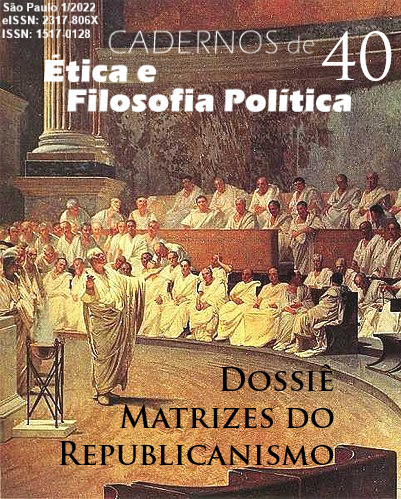O costume como fundamento do político e das leis em Montaigne
DOI:
https://doi.org/10.11606/issn.1517-0128.v40i1p74-85Palabras clave:
Michel de Montaigne, natureza, costume, política, leisResumen
Os costumes – coustumes – têm um papel central em Os Ensaios de Michel de Montaigne. Não só porque deles o ensaísta extrai os mais variados exemplos – leçons – utilizados em seus textos, mas sobretudo porque Montaigne entende que as regras morais, as leis, a ordem civil e toda convenção social estão ancoradas na sedimentação dos hábitos ao longo dos anos. O que, a princípio, parece trivial, é, na verdade, uma guinada em relação à tradição filosófico-política, na medida em que Montaigne desloca a fundamentação do político, da moral e das leis da própria natureza – como concebiam os filósofos da antiguidade – e de Deus – como concebiam os filósofos cristãos –, para o terreno dos costumes, terreno este eminentemente humano. Este artigo detém-se num capítulo – De la Coustume et de ne Changer Aisément une Loy Receue – dos Ensaios para demonstrar como Montaigne opera esse deslocamento das leis e do político do fundamento natural para os costumes – mos maiorum.
Descargas
Referencias
BODIN, Jean. Iuris universi distributio (1580). In : Œuvres Philosophiques de Jean Bodin. Paris, PUF, 1951. Apud BARROS, Alberto Ribeiro G. de. Direito natural e propriedade em Jean Bodin. São Paulo: Trans/Form/Ação, n. 29 (1), 2006.
BERNS, Thomas. Violence de la loi à la renaissance: l’originaire du politique chez Machiavel et Montaigne. Paris: Editions Kimé, 2000.
BLAIR, Ann. The theater of Nature: Jean Bodin and Renaissance Science. Princeton, New Jersey: Princeton University Press, 1997.
BOBBIO, Noberto. A teoria das formas de governo. Tradução de Sérgio Bath. Brasília: Editora Brasiliense, 1998.
BRAHAMI, Frédéric. Montaigne e a política. In: Revista Sképsis, ano VI, nº 9, 2013, p. 86-114.
FONTANA, Biancamaria. Montaigne’s politics: authority and governance in the Essais. Princeton/Oxford: Princeton University Press, 2008.
LA BOÉTIE, Etienne de. Discurso da Servidão Voluntária. Tradução de Laymert Garcia dos Santos com comentários de Pierre Clastres, Claude Lefort e Marilena Chauí. São Paulo: Editora Brasiliense, 1999.
MONTAIGNE, Michel de. Os Ensaios. Livro I. Tradução de Rosemary Costhek Abílio. São Paulo: Martins Fontes, 2000.
MONTAIGNE, Michel de. Os Ensaios. Livro II. Tradução de Rosemary Costhek Abílio. São Paulo: Martins Fontes, 2006.
MONTAIGNE, Michel de. Os Ensaios. Livro III. Tradução de Rosemary Costhek Abílio. São Paulo: Martins Fontes, 2001.
NAKAM, Géralde. Les Essais de Montaigne: miroir et procès de leur temps. Paris: Librairie A.G. Nizet, 1984.
PRAT, Sébastien. Le “jeu de la constance” et le plus “apparent vice de nostre nature”: Constance et inconstance dans les Essais de Michel de Montaigne. Thèse de doctorat. l’Université de Montréal et l’Université de la Sorbonne-Paris IV, 2009
RANDALL, Michael. “Montaigne et des juges véreux”. In: JOUHAUD, Christian; SOUDAN, Cécile; VIALA, Alain. À l’enseigne du GRILH: quelques parcours en histoire du littéraire. Paris: Centre de Recherches Historiques (CRH), 2018, p. 5. Disponível em: https://journals.openedition.org/dossiersgrihl/6778. Consultado em 02/06/2022.
SCHAEFER, David Lewis. The political philosophy of Montaigne. New York: Cornell University Press, 1990.
Descargas
Publicado
Número
Sección
Licencia
Derechos de autor 2022 Natanailtom de Santana Morador

Esta obra está bajo una licencia internacional Creative Commons Atribución-CompartirIgual 4.0.


